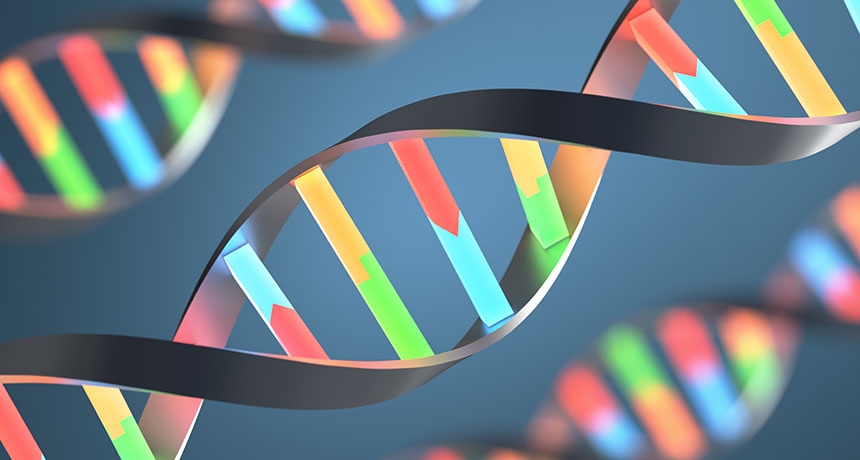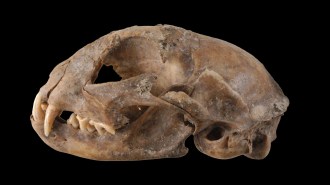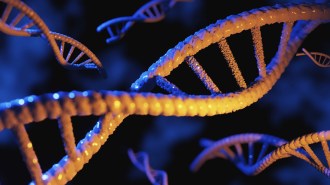
DIFFERENT DNA A study of more than 60,000 people’s genes reveals previously hidden genetic diversity.
BeholdingEye/iStockphoto
A large study of human genetic variation finds more than 7 million spots where one person’s DNA can differ from another’s. Analyses of such variants, compiled from cataloging the genes from more than 60,000 people, are already offering doctors helpful insights into diseases such as schizophrenia and some heart conditions.
Researchers from the Exome Aggregation Consortium first presented their analysis of the ExAC database online at bioRxiv.org last year (SN: 12/12/15, p. 8). Now, the project is getting its official debut in the Aug. 18 Nature.
An exome is just the protein-producing genes in a person’s genetic instruction book, or genome. Researchers from nearly two dozen studies around the world pooled exome data they had collected from 60,706 people, nearly 10 times more data than any previous study of human genetic variation. The people in the study were far more racially and ethnically diverse than any previous study as well, and included both people with various diseases and healthy people.
Any one person carries tens of thousands of DNA variants, said Daniel MacArthur, a geneticist at Massachusetts General Hospital in Boston, in a telephone press briefing. The ExAC team found that, on average, one in every eight DNA bases (the information-encoding chemical building blocks of DNA) differs among people. In total, the researchers recorded more than 7.4 million DNA variants, most of them changes in single DNA bases.
ExAC researchers released the data in 2014 for other scientists to use. Already these data have contributed to the day-to-day interpretation of genetic information in the clinic, says Eliezer Van Allen, a medical oncologist at Harvard Medical School. “It gives a new look into the drivers of human genetic diversity.”
A companion paper published August 17 in Nature Genetics, for instance, found that people are missing some genes or have extra copies of other genes. On average, people have 0.81 deleted genes and 1.75 duplicated genes. The analysis echoed previous studies in showing that people with schizophrenia are more likely to have such missing or duplicated genes, particularly genes important in the brain.
It’s a relief to researchers that the paper confirms the results of previous schizophrenia studies, says Jennifer Mulle, a psychiatric geneticist at Emory University in Atlanta who was not involved in the work. “We all breathe a collective sigh of relief that this thing we thought to be true continues to be true,” she says.
Now, the challenge is to figure out what all of the variations mean.
Two independent studies suggest that the ExAC data could give doctors and researchers a clearer picture of the gene changes that contribute to heart conditions known as cardiomyopathies.
As DNA sequencing studies, which decipher people’s genetic makeup, became more common in the last 10 years, researchers amassed a growing number of rare DNA variants implicated in causing the heart diseases. “There was always a lot of doubt cast about whether these [variants] were real or not,” says Roddy Walsh, a geneticist at Imperial College London.
Walsh and colleagues used the ExAC data and DNA data from 7,855 cardiomyopathy patients to reevaluate the likelihood that a particular variant would cause a heart problem. Finding a variant in heart patients that is rarely seen in people without the disease suggests the variant could be causing the disease. But if the variant appears just as often in the general population that don’t have cardiomyopathies as in patients, it is unlikely to cause disease.
Of the people in ExAC, 11.7 percent carry variants associated with hypertrophic cardiomyopathy, Walsh and colleagues report August 17 in Genetics in Medicine. That’s far more people than expected for a rare inherited heart condition, which strikes about one in 500 people. Those data and other evidence suggest that many of the variants implicated in the disease are actually benign, the researchers say.
ExAC data alone aren’t enough to rule out a potentially disease-causing variant, says Benjamin Meder, a cardiologist at Heidelberg University Hospital in Germany. Researchers don’t know the full medical history of the ExAC volunteers. Some may have undetected cases of cardiomyopathy, or others may have been misdiagnosed as having the disease, which could throw off the results, he says. It’s important to clearly define who has a disease and who doesn’t before conducting genetic studies, Meder says. “This paper does it the wrong way around.” Still, he says the study does offer some valuable insights into the genetics of heart problems.
Misdiagnosing a genetic disease can negatively affect entire families, says Isaac Kohane, a biomedical informaticist at Harvard Medical School. For instance, people related to a young person who collapses on the basketball court and is found to carry a rare variant associated with the heart condition may also be screened for the genetic variant. Family members carrying the disease-associated variant may be treated for a condition they don’t have.
Such misdiagnosis is much more likely for African-Americans, Kohane and colleagues report August 17 in the New England Journal of Medicine. Five variants previously associated with hypertrophic cardiomyopathy kept popping up again and again in the general population most of whom do not have the heart condition, Kohane’s team found. Those variants are far too common to cause a rare genetic disorder; 2.9 to 27.1 percent of black Americans were found to carry at least one copy of the variants, while 0.02 to 2.9 percent of white Americans had one of the variants.
Kohane and colleagues now say the variants are benign. The mistake could have been avoided if researchers had included even a few black Americans in their studies, most of which involved people of European descent who carry only a fraction of the genetic diversity found people with recent African ancestry. The researchers calculate that the ExAC data, with its great genetic diversity, could rule out many benign variants including ones carried by 0.1 percent of the population.







